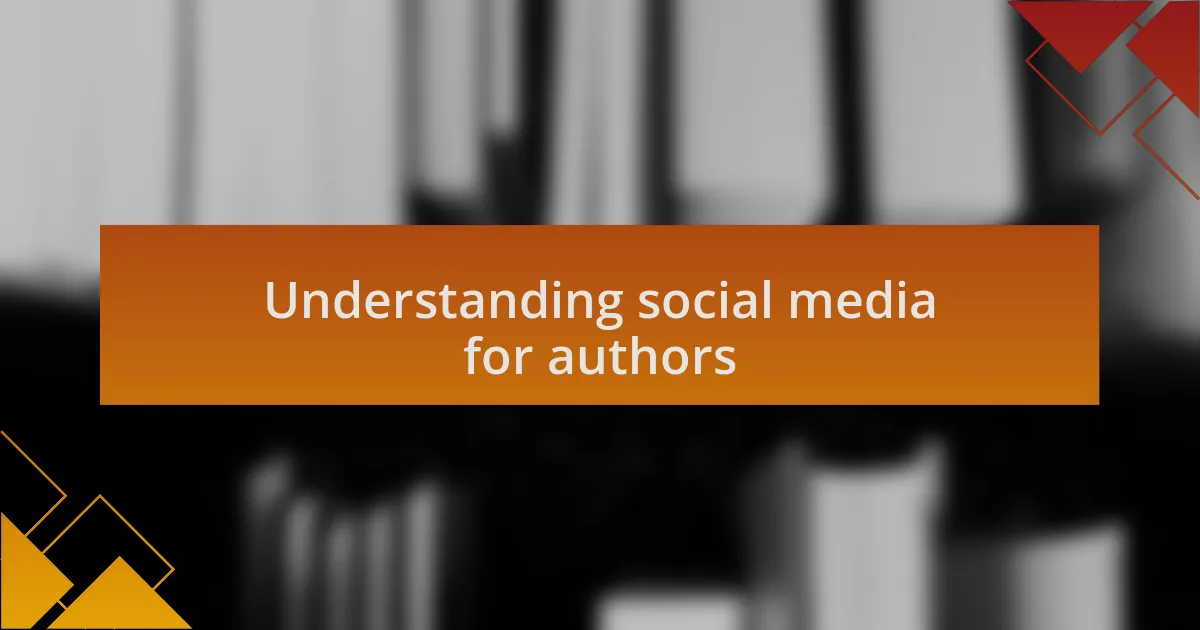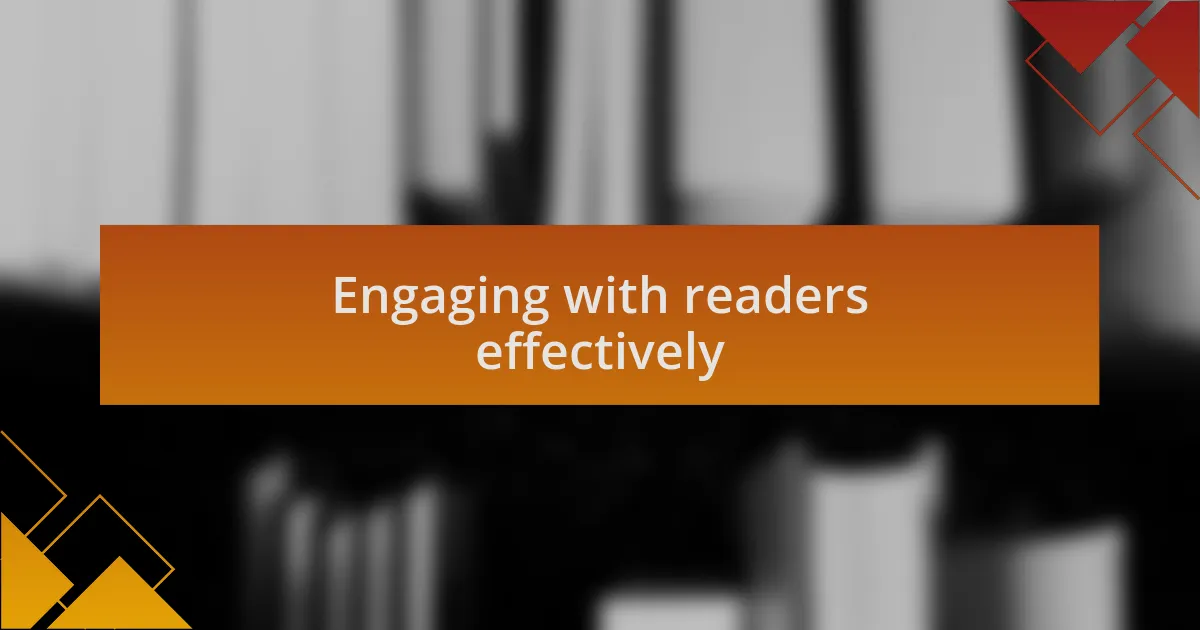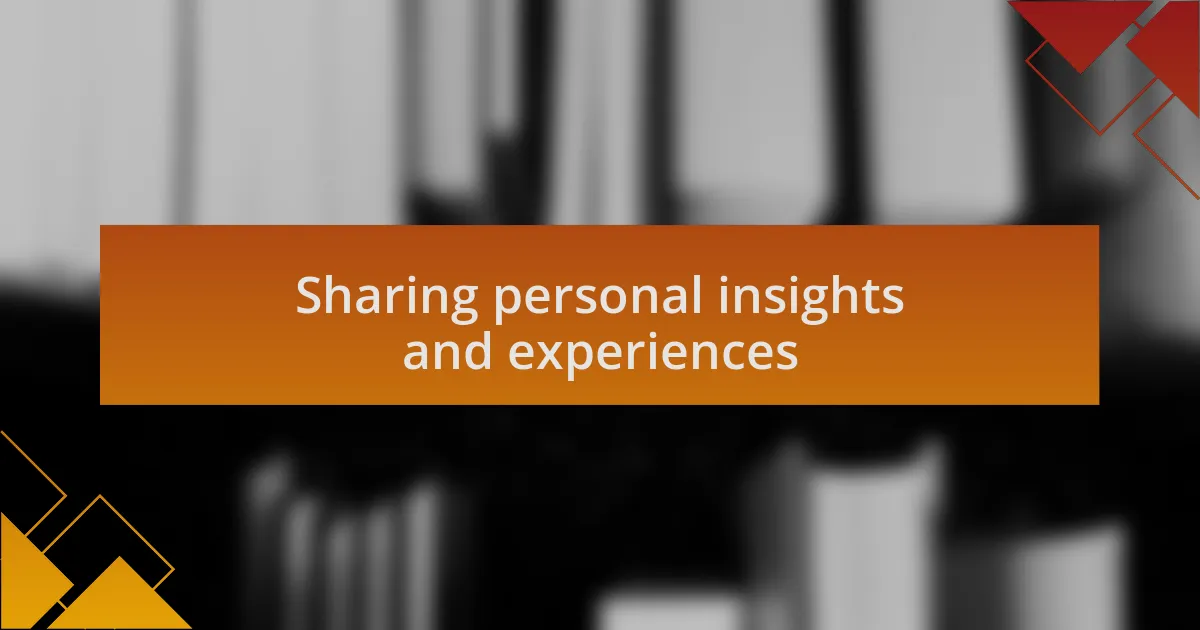Key takeaways:
- Social media is a community for authors to connect with readers and industry professionals, enhancing the writing journey through engagement.
- Choosing the right platforms, such as Instagram and Twitter, is essential for authenticity and effective communication with your audience.
- Building an author brand relies on sharing personal experiences and maintaining consistency to foster deep connections with readers.
- Engaging effectively involves real-time interactions and storytelling, which help cultivate trust and community among followers.

Understanding social media for authors
As an author, I quickly realized that social media is more than just a tool; it’s a vibrant community. When I first joined Twitter, I was surprised at how authors, readers, and industry professionals interacted in real-time. It felt like stepping into a global coffee shop, where I could engage in conversations that ranged from writing techniques to plot twists. Have you ever felt that rush when your tweet gets a response from a reader? That sense of connection can truly energize your writing journey.
Navigating social media can be daunting, especially with the endless platforms available. I found that focusing on just one or two platforms helped me build more meaningful relationships. For instance, Instagram allowed me to share snippets of my writing journey through visuals, which really resonated with my followers. Have you considered how a visual element could enhance your storytelling? Engaging directly with readers through pictures and stories can create a deeper bond, reinforcing your author brand.
Then, there’s the challenge of finding your voice amid the noise. When I first started posting, I felt a pressure to portray a perfect image. But embracing authenticity made a world of difference. Sharing my struggles with writer’s block or celebrating small victories humanized my experience and made readers more likely to connect with me. Don’t you think that vulnerability can resonate more than a polished facade? By being real, I found that my audience related to my journey, which ultimately helped grow my platform.

Choosing the right platforms
Choosing the right platforms can significantly impact your visibility as an author. I started with Facebook and quickly realized that it wasn’t the best fit for my style; the algorithm made it tough to reach my audience organically. Switching to platforms where my voice could shine, like Twitter and Instagram, was a game-changer. Have you thought about where your audience spends the most time?
In my experience, LinkedIn has its merits, especially for networking with publishing professionals. I remember sharing an article about self-publishing there, and it opened up invaluable connections with editors and agents who appreciated my insights. Each platform serves a different purpose, so consider the conversations you want to have and with whom. What type of engagement excites you most?
Finally, don’t overlook niche platforms specific to your genre. I’ve found communities on Goodreads that cater precisely to my readers, where I can discuss my books and connect with like-minded individuals. The right platform isn’t just about numbers; it’s about cultivating genuine relationships and conversations. Reflecting on your goals can guide you to the platforms that will serve you best.

Building an author brand online
Building an author brand online is all about authenticity and consistency. I learned this firsthand when I started sharing not just my writing but also my journey. It was daunting at first to reveal my struggles and successes, but the connections I made with readers who resonated with my story were invaluable. Have you considered how sharing your unique experiences can draw in your audience?
Visuals can also play a vital role in branding. One time, I crafted a series of Instagram posts that showcased my writing process through behind-the-scenes images, and the response was beyond my expectations. Readers love to feel like they’re part of your creative journey, so what visuals will help convey your story? Each image is an opportunity to reflect your brand’s personality.
Lastly, engagement is key. I remember responding to comments on my posts and emails from readers, which sparked interesting discussions and fostered a loyal following. It’s not just about broadcasting; it’s about building a community. How are you encouraging dialogue with your audience? Establishing two-way communication can transform your online presence and strengthen your author brand.

Engaging with readers effectively
Engaging with readers effectively means making them feel valued and heard. I recall a time when I hosted a live Q&A session on social media. The thrill of directly interacting with readers brought my writing to life in a way that simple posts never could. Have you ever considered how real-time conversations can deepen connections?
In my experience, storytelling is a powerful tool when engaging with your audience. Once, I shared a vulnerable moment about my writing process—how a character just wouldn’t cooperate—and it resonated with many who had faced similar issues. It’s fascinating how sharing our struggles can show readers they are not alone in their experiences. What personal stories can you share to foster that connection?
Consistency is also crucial for effective engagement. I made it a habit to create regular updates about my writing journey, sharing both achievements and setbacks. This transparency not only kept my readers informed but also established a rhythm in our interactions. Have you thought about how your consistent presence can transform your online community? Regular engagement cultivates trust and anticipation among your readers.

Sharing personal insights and experiences
Sharing personal insights has always felt like peeling back layers, revealing the person behind the words. I remember the time I shared my battle with self-doubt on my social media platforms. The flood of supportive messages from readers who related to my vulnerability was both humbling and affirming. Have you ever felt the rush of connection when you open up about your experiences?
Every now and then, I like to post snippets of my writing journey—like the excitement I felt when a short story I labored over finally found a home. It’s not just about the work; it’s about the emotions tied to these moments that resonate with others. This kind of sharing turns my social media channels into a diary that others want to read. What moments from your own journey can you share that might surprise or inspire your audience?
The beauty of sharing personal stories lies in the unexpected responses they elicit. Once, I posted about a particularly tough revision process, and the conversations that sparked were both enlightening and heartfelt. I learned that by opening up about my creative challenges, I created a space where others felt safe to do the same. Have you thought about the walls you can break down simply by being honest with your readers?